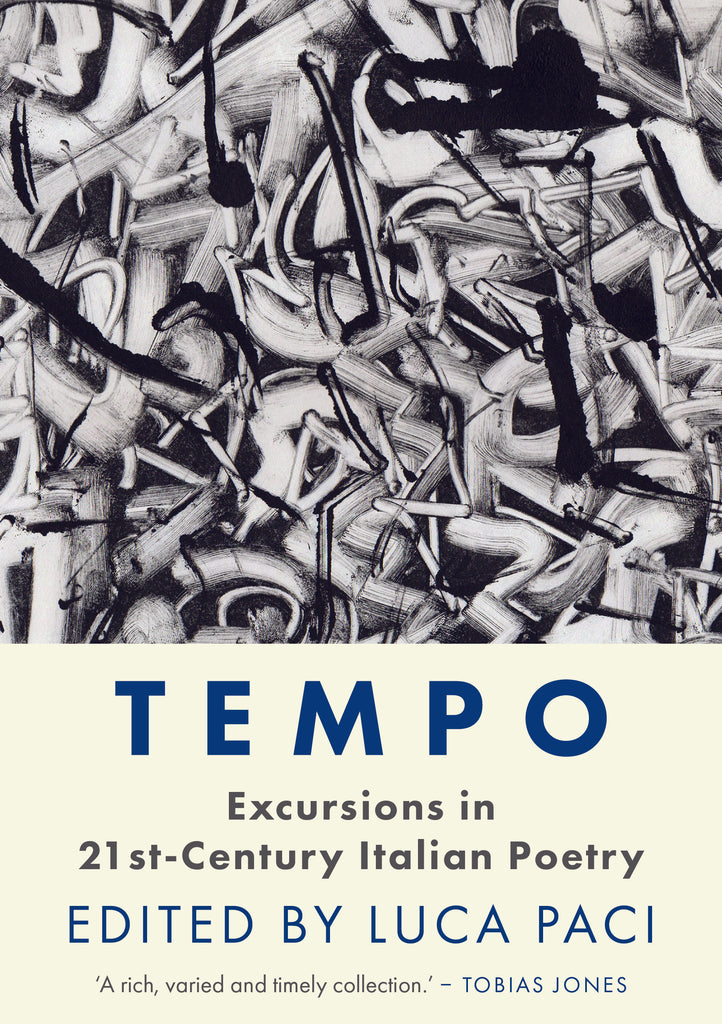The paperback edition of Tempo: Excursions in 21st-Century Italian Poetry is out today!

The anthology of contemporary Italian poetry offers an extraordinary array of styles, voices, approaches, ways of looking at the world and ways of representing it. This anthology tries to capture the multiplicity of these voices with its selection of the most representative poets from different backgrounds: academics, working-class writers, editors, journalists, performers, travellers and professional translators. The reader will discover a diverse poetry dealing with the topical concerns of identity, sex, politics, migration and race.
Available now in your local bookshop or order direct from us with just 99p UK postage!
'Reading Tempo, it felt not like a collection of Italian poetry but of Mediterranean tongues. Each time I turned the page, there was something unexpected: not just the obviously different geometry of the lay-outs and languages, but also the subject matter – political verse, love poems, spiritual paradoxes, threnodies. With exquisite translations, this volume felt constantly inventive but also strangely restful.' – Tobias Jones
To celebrate the release of the paperback of Tempo we're sharing the introduction to the anthology by editor Luca Paci. Read below.
Contemporary Italian poetry is still a widely unknown space for the general English-speaking public. We need to go back to the 20th-century Nobel Prize winners such as Eugenio Montale and Salvatore Quasimodo if we want to see some evidence in the English readership of the vitality of this poetic tradition.
The fact that works in translation play a marginal part in the actual publishing market might be one of the reasons why such a vibrant culture of a major European country is not fairly represented.
As translingual (English and Italian) author Jumpa Lahiri wrote, ‘Language is the substance of literature, but language also locks it up again, confining it to silence and obscurity. Translation, in the end, is the key.’ (Lahiri, 2019).
Hopefully this anthology, in its bilingual structure, will give a little acknowledgement to the extraordinary work that translators carry out and have broader ramifications in the English-speaking culture and society, helping to recognise the unique significance of Italian poetry.
I would like to begin from a couple of simple but necessary questions. How does one start compiling a 21st-century anthology?
In other words, what are the criteria to follow, and what kind of inclusiveness, one should aim for?
My attempt to answer these questions is the outcome of a very personal journey as a reader, teacher, poet and translator living and working in the UK for over twenty years. My view of Italy is inevitably affected by the physical and imagined distance between myself and my country of origin.
As writer and academic Luigi Meneghello puts it, ‘I realise that the point of view keeps on fluctuating.’(Meneghello, 1997). I believe that this fluctuation, pulling me physically, symbolically and intellectually from Italy to the UK and vice versa, plays a fundamental part in this investigation into contemporary Italian poetry.
If my standpoint is different, so is my judgement and perception of the culture in question. Observing events from a different angle, as from an upside down telescope, encourages comparisons and contrasts. Diversity – this key concept we are finally beginning to come to terms with – becomes a very tangible factor.
Over the years I have become intensely aware of the linguistic, cultural, sociological and political differences as well as points of contact between Italian and Anglo-American culture. I have also experienced the power of poetry’s seemingly elusive yet penetrating and flexible forms, and its capacity to engage with matters such as identity, culture, society, sex, race and politics.
I am persuaded that poetry has its own epistemic value and cannot be read in distraction: it requires the full intellectual and emotional intelligence of the reader as well as their sense of empathy. Poetry is an essential tool to understand and question at a deeper level events, feelings and attitudes of present and past, recognising the complexity of reality in a radically different way.
The French philosopher Gaston Bachelard talks about poetry as reverberation, a mental posture, thanks to which things and events are not linked by causality or logic but rather by their individual and pictorial significance where ‘the reader is asked to consider an image not as an object … but to seize its poetic reality.’
(Bachelard, 1994).
Contemporary Italian poetry explores the linguistic practices of a country conscious of its many dialects and minority languages; its formidable strengths and tensions. The authors chosen for this anthology offer an extraordinary range of styles, tones, approaches, ways of looking at the world and ways of representing it.
It is a selection of major poets from different backgrounds: academics, working class writers, editors, journalists, spoken-word performers, travellers and professional translators. Each voice has its unique accent, poetics, style and subject.
This poetry is not afraid to interrogate itself and its contradictions. Part of it is experimental and daring, multilingual and asemic. It probes the very possibility of language and its unconscious, asking questions on its ontology, status, and territory. It expresses itself in a form where past and present often collide and reconcile, memory and trauma are expressed in new and deconstructed types of lyricism. It is a poetry that is at times self-translated (in fact most of the poets are also translators) and translingual. Transparent and intricate, it is multifaceted and never clichéd.
Sometimes verses are constructed like an installation, at other times they are elemental. These are poems that criticise the language of power and reach for the people at the margin of the new global economy (women, the disabled, transgender people, migrants) and explore, with bold originality, the experience of separation and exclusion.
Here one can find a distinctive depth and profound understanding of suffering, a constant search of an interior space which goes beyond the Catholic façade which forms a large part of Italian ‘religiosity’.
There is a lot to learn about contemporary Italy in these verses often ‘embodied’ in performance poetry and physically reflecting the distress of a wonderful and troubled nation still in search of identity.
Luca Paci
Cardiff, 2022
Dive into the rich landscape of Italian poetry and order your copy today.



